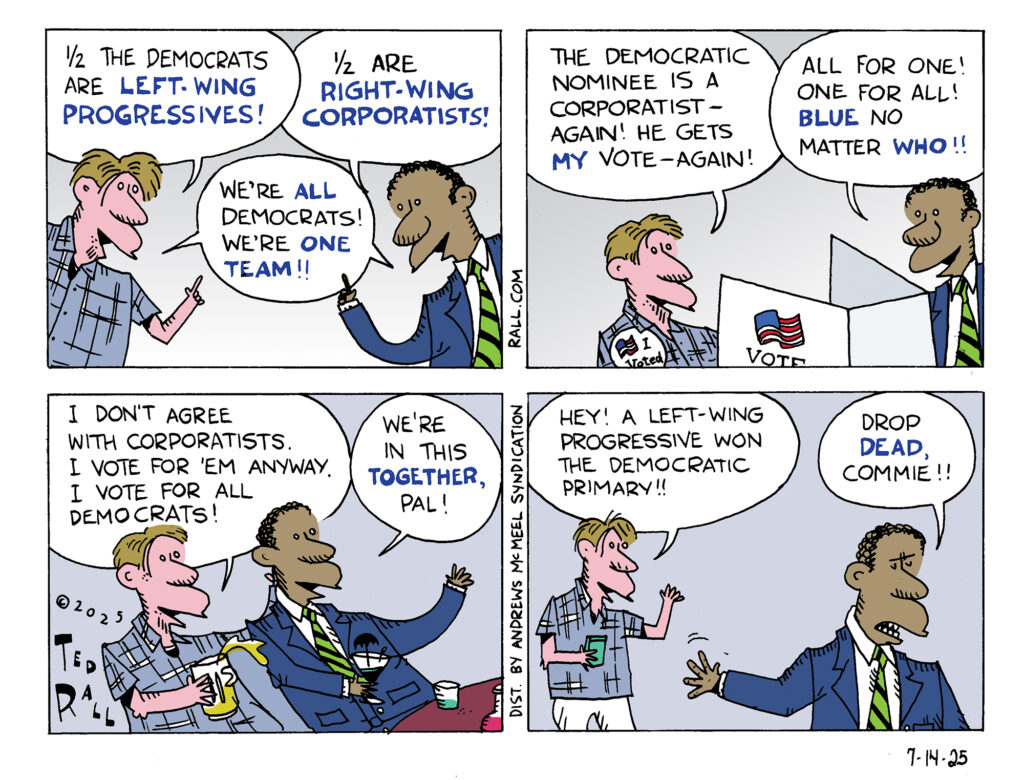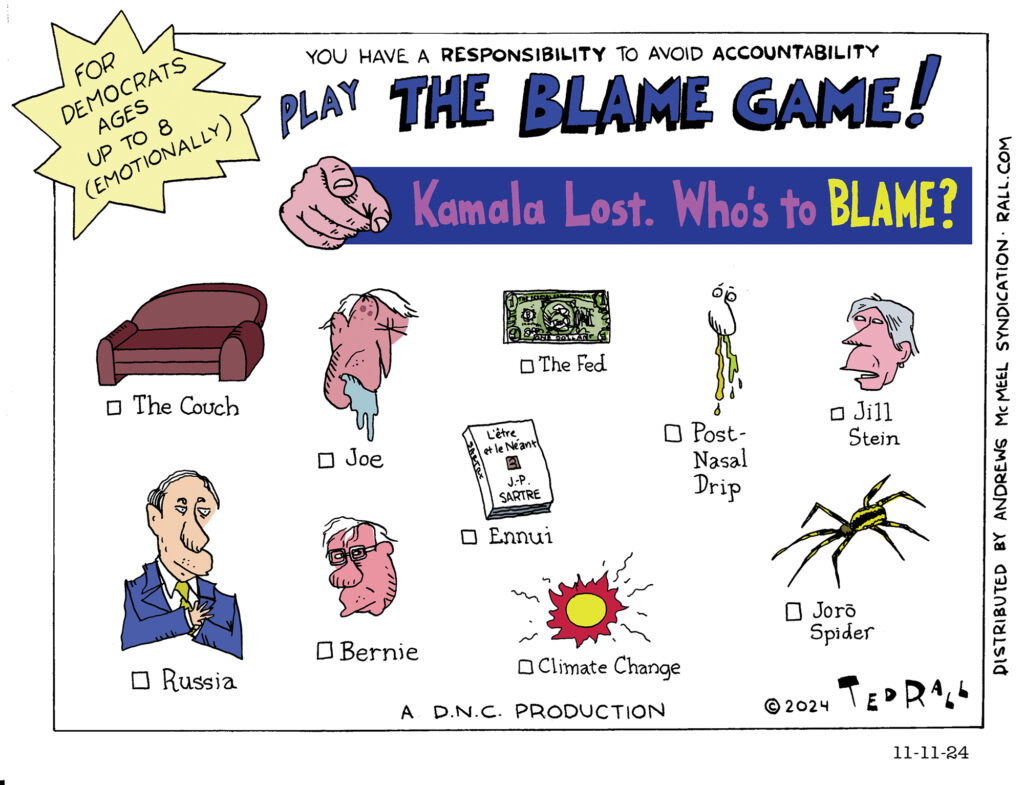The Democratic Party is divided into two factions: left-wing progressives, such as Bernie Sanders and Alexandria Ocasio-Cortez, and right-wing corporatists, such as Joe Biden and Chuck Schumer. Corporatists control the party, so most nominees are corporatists. They urge progressives to remain loyal and “vote blue no matter who” to defeat Republicans. However, when a progressive secures the nomination, corporatists often refuse to support them and may even align with Republicans to undermine them. This happened to Bernie Sanders and is now happening to Zohran Mamdani in New York City. The Democratic Party is only unified in one direction.
What’s Wrong with the Democrats? They Need More Democracy
What’s wrong with the Democrats and how can the party be fixed? When an insurgent outsider candidate from the party’s progressive left defeats a moderate endorsed by the establishment, Democratic leaders reject the results and deny the will of their voters. They refuse the infusion of new ideas and tactics every organization needs to evolve. They anger their voter base. They lose elections they should have won.
It’s time for Democrats to democratize their party.
Democrats’ top-down leadership style is currently being deployed against Zohran Mamdani, the democratic socialist winner of New York City’s mayoral primary who defeated corporate favorite Andrew Cuomo. The primary results came in over a week ago, yet none of the party’s big guns—Obama, Schumer, Jeffries, Pelosi, Buttigieg, Newsom, Harris, DNC chair Ken Martin—has endorsed Mamdani. Ever the happy warrior, Mamdani says he’s grateful for the kind words he has received from his ideological fellow travelers Bernie, AOC and other members of The Squad. But the establishment’s silence is hypocritical—when the primary winner is a centrist like Biden, the Left is expected to fall in line—and telling.
Not so behind the scenes, the top Democrats who are not that into democracy are following the backroom skullduggery deployed against Howard Dean, Dennis Kucinich and Bernie Sanders. Eric Adams, the incumbent mayor elected in 2021, opted out of the Democratic primary due to his rock-bottom approval ratings amid federal corruption charges, which Trump’s DOJ dropped in exchange for opening his sanctuary city to ICE deportation operations. Yet he’s still running for reelection in the general election, as an independent under his one-man “End Anti-Semitism” line. Adams’ base is big business and Zionists. Cuomo is currently running too.
There’s a Republican, too—Curtis Sliwa, founder of the Guardian Angels. But he’s not a major factor in an 11% Republican city.
Billionaire Trump supporter Bill Ackman, hedge fund manager Daniel Loeb, former hedge fund executive Whitney Tilson, Kathy Wylde of the Partnership for New York City, along with the Murdoch-owned New York Post, want the disgraced Cuomo and the marginal Sliwa to step aside and consolidate the anti-Mamdani vote behind the disgraced Adams.
Even with the Post’s rabid attacks (“Socialist Mamdani Wants to Pay for Government Grocery Stores with Money That Doesn’t Exist,” “Zohran Mamdani’s ‘No Billionaires’ Dream Fits His Goal — To Make Us All Live in Equal Misery,” “With Code Words and Dog Whistles, Mamdani Puts a Pretty Face on Hate”), it’s too early to tell whether Adams’ unlikely alliance of Wall Street and Black voters can defeat Mamdani. But primary winners tend to perform better in general elections when their party is united. Support from party bosses is essential.
Obama’s opposition to the Iraq War and appeal to young and minority voters positioned him as an outsider challenging the party’s entrenched leadership in 2008, when he challenged Hillary Clinton in the primaries. His diverse coalition and fundraising prowess forced the DNC to embrace him. They won.
Similarly, party leaders got behind AOC and Squadsters Rashida Tlaib, Ilhan Omar, Jamaal Bowman and Cori Bush after they won their congressional primaries. All won.
DNC sandbagging of Bernie had mixed results. The first time, in 2016, it led to Hillary’s defeat in a contest Bernie would have been likelier to have won. Biden/Harris, the establishment choice, prevailed in 2020 but progressives who sat out contributed to the vice president’s defeat in 2024.
Though they constantly characterize Republicans as enemies of American democracy, Democrats who want to democratize their party should consider emulating their rivals. With fewer superdelegates who skew primaries toward the establishment, the GOP is structurally representative of its voters. And its party leaders tend to set their personal preferences aside when voters prefer an insurgent outsider.
The results confirm Newt Gingrich’s observation that “by definition, the person who learns enough to become the nominee is almost certainly the best person for the general election.”
Donald Trump, a businessman and reality-TV personality with no political experience, entered the 2016 primary on a lark and defeated establishment favorites Jeb Bush and Marco Rubio. Stalwarts like Mitt Romney and Paul Ryan opposed Trump but, in the end, pragmatism prompted acceptance and a unified GOP defeated Hillary.
Arnold Schwarzenegger, another political novice, ran in the 2003 California gubernatorial recall election. State GOP bosses preferred conservatives like Tom McClintock and Bill Simon because Schwarzenegger’s moderate politics (pro-choice, environmentalist) made him an outsider. After Schwarzenegger won 48.6% of the vote in a crowded field, GOP leaders fell into line. He won two terms.
In another insurgent campaign Rand Paul, a libertarian ophthalmologist, won the 2010 GOP Senate primary. Mitch McConnell and other Kentucky party bosses had backed Trey Grayson. The party embraced him to co-opt his Tea Party base. Paul holds a steady seat. J.D. Vance, Marco Rubio, Ted Cruz and Dave Brat of Virginia all followed the path of the outsider who defeated establishment-backed candidates and were nevertheless accepted by the party hierarchy.
Like Democrats, Republicans lose when they fail to coalesce behind their insurgent primary victors. Some state Republican officials were displeased when former news anchor Kari Lake, a former news anchor, defeated establishment-backed Karrin Taylor Robson in the 2022 Arizona gubernatorial primary. The RNC supported her but it wasn’t enough. A similar fate befell Sharron Angle and Christine O’Donnell in their 2010 Senate races in Nevada and Delaware, respectively.
History is clear. The smart move for Democrats is to unify behind their winning primary candidates, whether they are establishment favorites or progressive insurgents. New York and national Democrats should endorse, fund and campaign Zohran Mamdani.
(Ted Rall, the political cartoonist, columnist and graphic novelist, is the author of “Never Mind the Democrats. Here’s WHAT’S LEFT.” Subscribe: tedrall.Substack.com.)
TMI Show Ep 167: “The War for the Democratic Party”
LIVE 10 AM Eastern time, Streaming Anytime:
“The TMI Show with Ted Rall and Manila Chan” called it yesterday—a “democratic socialist” is likely to become New York’s next mayor! Today, Ted and Manila break down the implications of this stunning rebuke of the Democratic establishment by enraged New York voters! Zohran Mamdani, a 33-year-old democratic socialist, declared a landslide victory after Andrew Cuomo conceded in a jaw-dropping referendum on the centrist-run National Democrats. The young, progressive state Assembly member, virtually unknown at the race’s start, built a commanding lead over the scandal-tainted former governor with a campaign laser-focused on high prices, especially rents. Though ranked choice voting will finalize the outcome, Mamdani will become NYC’s first Muslim and Indian-American mayor if he wins the general election. Cuomo, once the front-runner, relied on his political dynasty and hefty corporatist endorsements but couldn’t overcome his past or left-wing anger. Mamdani’s optimistic vision, backed by AOC and Bernie Sanders, rallied the Left, setting up a fierce general election race against incumbent Eric Adams, running as an independent amid federal corruption charges, and Republican gadfly Curtis Sliwa. This race is a snapshot of the Democratic Party’s ideological split. Will the old Clintonite corporatist wing of the party finally give up power to the new left, or will it again resort to the sleazy tricks it has used to kneecap progressives and hand victory to the Right?
Plus:
Trump’s strikes on Iran’s nuclear sites caused damage but didn’t destroy them, risking World War III over nothing, the US intelligence community believes.
NATO leaders promise to boost war spending to 5% of GDP by 2035, spurred by Trump despite an absence of threats.
Florida’s “Alligator Alcatraz” detention center nears completion, raising environmental and human rights concerns.
DMZ America Podcast Ep 181: Democrats Take Stock; Hunter Biden Pardoned
The DMZ America Podcast’s Ted Rall (on the Left) and Scott Stantis (on the Right) are joined by syndicated columnist Clarence Page of the Chicago Tribune to discuss the despondent state of the Democratic Party in the wake of their defeat. Progressives like Bernie Sanders say the party erred in neglecting the working class, moderates think the party appears too “woke” for mainstream Americans and it’s hard to reconcile Biden and the Democrats’ criticism of Donald Trump as dishonest with his decision to pardon Hunter Biden despite numerous categorical denials that he would do so. Where does the Democratic Party go from here? Is “resistance” possible and, if so, what will it look like?
The TMI Show Ep 16: Wounded Democrats Scramble to Regroup
On today’s TMI Show, co-hosts Ted Rall and Manila Chan are joined by former Pittsburgh Post-Gazette editorial cartoonist Rob Rogers to discuss the fallout of Trump’s reelection win, namely: Where do Democrats go now? What will a Democratic Resistance 2.0 look like? How effectively can Democrats block Trump’s initiatives? Are there areas in which Democrats and Republicans can work together in a bipartisan manner? Who are the rising stars within the party? Will Democrats continue to drift right to chase anti-MAGA Republicans, or will they follow the advice of Bernie Sanders and others who suggest that it’s time to either abandon the Democratic Party or take it over?
Keywords: Donald Trump, 2024 election results, 2024 election, 2024 campaign, Rob Rogers, Pittsburgh Post-Gazette, editorial cartoonist, political cartoonist, interview, Democrats, future, Bernie Sanders, MAGA movement, resistance
The TMI Show Ep 9: What Should Lefties Do About Kamala?
What do you do as a voter when your party isn’t that into you? On today’s TMI Show, in which there’s no such thing as Too Much Information, Ted Rall and Scott Stantis (guest hosting for Manila Chan) Progressive and other left-leaning Democrats are once again wrestling with a dilemma they’ve seen before: Kamala Harris has pivoted to the right of her party, eschewing progressive policies, campaigning with far-right Liz Cheney and supporting Israel against Gaza, and Ukraine against Russia.
Should progressives support Harris despite her snubs, hoping she secretly plans to move left of she wins? Should they punish her by voting third party or even for Trump? Or should they abstain from voting?
Refusing to Censor Speech Isn’t the Same as Agreeing with It
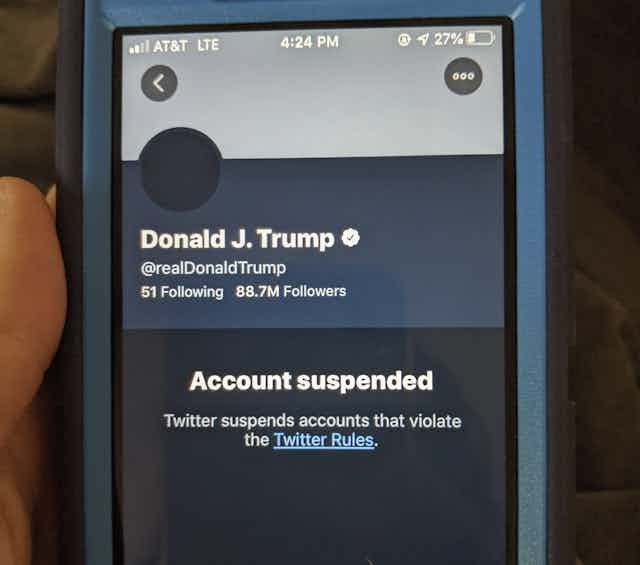 If someone said something I found annoying or offensive, my mother taught me, the appropriate response was to allow them to finish speaking and reply with a calm, considered counterargument. Now you’re supposed to talk over them until they shut up.
If someone said something I found annoying or offensive, my mother taught me, the appropriate response was to allow them to finish speaking and reply with a calm, considered counterargument. Now you’re supposed to talk over them until they shut up.
Or, better yet, cut their mic and show them the door.
Censorship has become a bipartisan norm. Why waste the time and energy to conceive and articulate an intelligent rebuttal when you can make your opponent shut up?
Alan Dershowitz, a nationally-known former Harvard Law professor, announced that he was leaving the Democratic Party because the party’s organizers allowed pro-Palestinian speakers to address its convention in Chicago. “They had more anti-Jewish, anti-Zionist people who were speaking, starting with [Representative Alexandria Ocasio-Cortez]–a miserable, anti-Zionist bigot,” Dershowitz said on “Talkline with Zev Brenner.” “Then of course they had [Senator Elizabeth] Warren, who is one of the most anti-Jewish people in the Senate. Then they had Bernie Sanders, one of the most anti-Jewish people in the Senate.” (Sanders is Jewish.)
“[B]y giving them platforms, what it says is that when AOC does call Israel a genocidal country and rails against it, she now has the imprimatur of the Democratic Party,” he argued.
On the opposite side of the ideological divide, high-profile podcaster and ex-Fox News host Tucker Carlson caught flak for hosting Darryl Cooper, a Holocaust revisionist, on his show on the social media platform X. Representative Mike Lawler of New York, told The Jewish Insider: “Platforming known Holocaust revisionists is deeply disturbing.”
I’m a leftist. Some of my fans lost their minds when I invited former Klansman David Duke to guest on my old talk-radio show on KFI Los Angeles. Feeling betrayed, they accused me of amplifying and tacitly endorsing a voice of the racist alt-right. I recall the exchange as vigorous, challenging and a rare opportunity to hear ideas on both sides of a variety of issues aired in an intelligent format.
The way I saw it, many Americans share Duke’s far-right views whether they hear them on the air or not. This was a chance to expose the existence of these thoughts to blissfully unaware liberals and workshop arguments against them. I would do it again in a heartbeat—but I’d become the target of even more venom now.
Platforming speech is not the same as endorsing what is said.
Platforming is the act of providing a means of public expression. A newspaper that publishes an interview with or even just a short quote by a person gives them a platform. A college that invites someone to give a speech or participate in a panel discussion is engaged in platforming, as is a cable network that decides to add a channel to its lineup.
None of these actions is a tacit endorsement.
Nor can it be.
Unless it limits its opinionists to a single voice or aggressively enforces a rigid set of ideological strictures upon a group of them—no one need apply unless they are, for example, socially liberal, fiscally conservative and opposed to military adventurism except in Myanmar—any newspaper’s decision to simultaneously platform one writer who disagrees materially with a second writer (and a third and a fourth) means that, by definition, there are contrasts and disagreements. Inherently, because no institution can simultaneously endorse conflicting points of view, no endorsement has occurred
Many news stories include quotes by both a Democrat and a Republican. If platforming the Democrat is an endorsement, how should one explain the appearance of the Republican? Most universities host speakers representing a range of views on a variety of subjects, many of them controversial. It makes no sense to imply that those institutions agree with everyone they invite on campus.
Until fairly recently, most Americans appreciated the value of showcasing a spectrum of ideological and stylistic views in public fora. Supreme Court Justice Louis Brandeis famously wrote in 1926 that the solution to offensive speech was “more speech, not enforced silence.” Today what we call Brandeis’ counter-speech doctrine—the answer to bad speech is good speech, not censorship—is in grave danger. Rather than argue against their opponents, cultural and journalistic gatekeepers are increasingly resorting to telling those with whom they to disagree to STFU.
Censorship drives dangerous rhetoric underground. It conveys a sense that purveyors of “mainstream” opinion are contemptuous of others, unable to defend their views, possibly intellectually feeble, and just plain bullies. Mostly, it doesn’t work.
After the January 6, 2021 attack on the Capitol, Twitter suspended 70,000 accounts, including that of President Donald Trump. Facebook acted similarly. A year later, in 2022, liberal censors claimed victory. “The best research that we have suggests that deplatforming is very powerful,” Rebekah Tromble, director of the Institute for Data, Democracy and Politics at George Washington University, told NPR. “It means that really prominent actors who helped stoke the Stop the Steal campaign that led to the insurrection have much less reach, get much less audience and attention. And that is very, very, very important.”
Was it? Donald Trump, the biggest January 6er of them all, is also the undisputed kingpin of the Republican Party, in whose primaries he ran unopposed. Running neck and neck with Kamala Harris, he may easily be reelected.
The belief that editors, producers, tech CEOs and other gatekeepers control enough outlets to deny their enemies an outlet to a significant audience is a profoundly flawed assumption. To whatever extent this was true in an era of four television news networks and cities with a morning and afternoon paper and not much else—and, even then, there were underground presses and alternative newsweeklies like The Village Voice—the Internet has blown that idea to smithereens. Al Jazeera, the Qatar-based cable news network whose American channel was shut down after the War on Terror-era Bush Administration leaned on U.S. broadcasters, disseminates live news from Gaza and other global hot spots via its website, which is one of the biggest in this country. InfoWars, Alex Jones’ “fringe” news site, gets 19 million views daily despite Jones’ epic legal defeat at the hands of parents whose children were killed at Sandy Hook Elementary School, who were awarded $1 billion. Any government or other corporate entity that tries to control information narratives in an era of fragmented media is playing whack-a-mole with a million rodents.
As long as there’s an audience for what someone has to say, you can’t keep a good—or bad—man down.
(Ted Rall (Twitter: @tedrall), the political cartoonist, columnist and graphic novelist, co-hosts the left-vs-right DMZ America podcast with fellow cartoonist Scott Stantis. His latest book, brand-new right now, is the graphic novel 2024: Revisited.)
Don’t Negotiate Against Yourselves, Lefties
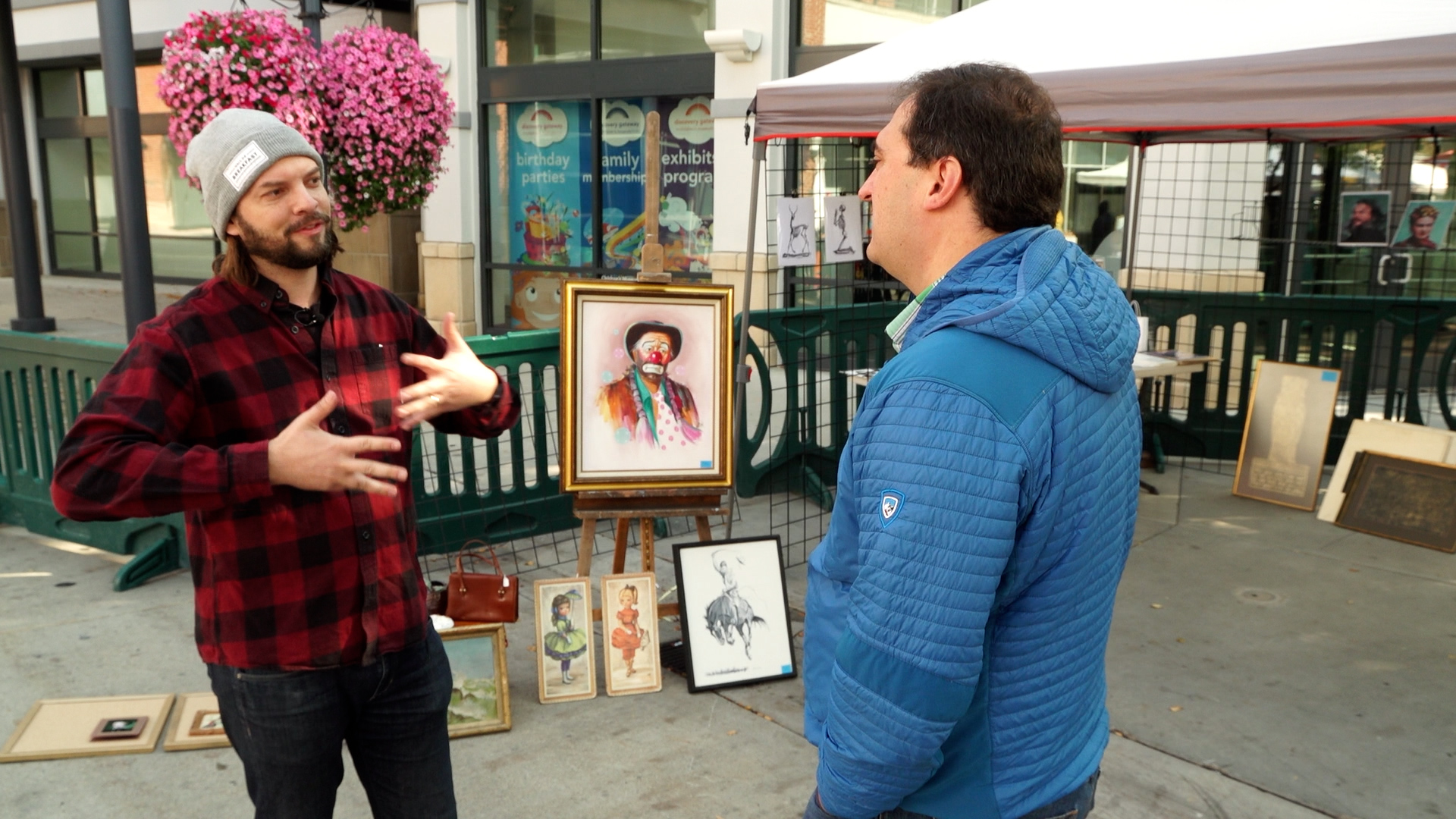 Anyone who has experience haggling at a flea market has intuited the basics of negotiating. If a seller offers the item you want at a fire-sale price that you’re unlikely to find elsewhere, smile, pay the asking price and walk away before they change their mind. If the requested price is many times higher than you’re willing to pay, just walk away. Stratospheric pricing pretty much eliminates the odds that you’ll be able to come to terms. Your time is better spend haggling with a different vendor. In other cases, offer a low-ball rate and work toward middle ground.
Anyone who has experience haggling at a flea market has intuited the basics of negotiating. If a seller offers the item you want at a fire-sale price that you’re unlikely to find elsewhere, smile, pay the asking price and walk away before they change their mind. If the requested price is many times higher than you’re willing to pay, just walk away. Stratospheric pricing pretty much eliminates the odds that you’ll be able to come to terms. Your time is better spend haggling with a different vendor. In other cases, offer a low-ball rate and work toward middle ground.
In politics, liberals tend to negotiate against themselves. Rather than pushing for radical change, Democrats begin with an incrementalist approach that factors in their conservative opponents’ counteroffer and begins from there. Since the Right is aggressive, they push back to the point that the resulting change is a smaller improvement that, in many cases, is so tiny as to be a rounding error. Obama’s opening gambit in the healthcare reform debate illustrates this phenomenon.
We know what we wound up with: Obamacare, originally developed by the right-wing Heritage Foundation, is a free-market scheme that prioritizes insurance-company profits, relies on economies of scale and assumes robust competition will reduce costs. (In practice, the healthcare business is de facto monopolized to the extent that there is little downward pressure on prices. The industry is disincentivized to participate in the public sector to the point that only a small fraction of the health plans available individually and via private employers can be purchased in the ACA’s online marketplace.)
The point is how the ACA as we know it came to pass. Obama, wielding considerable political capital at the start of his first term, decided to make healthcare reform his first major legislative priority. The public, long struggling under high costs for medical care and prescription pharmaceuticals, was supportive across party lines.
Right out of the gate, Obama negotiated against himself. Though he had promised during this campaign that the ACA would include a “public option,” i.e. the right to join what Bernie Sanders called Medicare For All, he agreed to drop it from the bill because, Democrats explained, they were short one vote in the Senate. Joe Lieberman, a right-wing independent senator from Connecticut, home to many of the nation’s major insurers, threatened to scuttle the measure via a filibuster parliamentary maneuver.
Rather than force Lieberman and his Republican allies to go on the record as having rejected a popular bill on a major issue, Obama dropped the public option. Obama noted the public option “has become a source of ideological contention between the left and right.” Anyway, he lied, “I didn’t campaign on the public option.” Good news: the ACA passed. But the lack of a public option was so unpopular (88% of Democrats wanted one) that it was a significant factor behind Bernie Sanders’ insurgent campaign in 2016. Instead of a towering achievement, Obamacare is widely viewed as a disappointment. The vast majority of Americans say its failure left the problem unsolved.
Shortly before he left office, Obama suggested that Congress add a public option to the ACA. This is what happens when you negotiate against yourself.
The 38% of Americans who oppose capitalism—socialists, communists, left libertarians and others to the Left of the Democratic Party—should take careful note of the Democrats’ repeated refusals to seek big changes and the subsequent failures that have followed as a result. Unlike the Democrats, who negotiate in Congress against Republicans who share their basic political values and assumptions on the relationship between workers and their labor, militarism and social priorities, we on the actual Left are fighting to overturn the system entirely.
Our goal is Revolution. But we are completely, for the time being, disorganized. There is no viable leftist political party with a revolutionary orientation, no well-funded highly distributed media outlet to disseminate news and opinion with our point of view. We have, not even in the so-called progressive “Squad” in the House of Representatives, zero elected representatives who seek to abolish capitalism and prioritize the needs and desires of the people. Absent these basic organizational structures or an as-yet-undeveloped Internet-driven organizational strategy that short circuits traditional grassroots organizing and agitation strategies, emancipation by revolution will continue to elude us.
In the meantime, we must lay the groundwork for revolutionary foment. We must, within the constructs and limitations of the current capitalist system, expose the true nature of a government that claims to be by and for the people but is in truth nothing but a Ponzi scheme that extracts wealth upward from the poor and the working class up to the tiny few at the top point of the pyramid. We can and must accomplish this by exposing the system’s internal, self-evident contradictions.
This begins by asking why the powers that be repeatedly and continuously find billions of dollars for all manner of destructive nonsense—foreign wars, corrupt defense contractors, tax breaks to for-profit corporations—repeatedly and continuously inform us that there is never enough money to satisfy basic human needs.
We know, when we demand that everyone have enough to eat, that the political elites will refuse or ignore us. We expect, when we demand that everyone be housed, that we will be told to stuff it. We understand, when we demand that a day of work should be paid fairly, that we are asking for something that they will never agree to—indeed, that they cannot because it would destroy them and their self-perceived identity in the power structure.
We make demands, not because we believe they will be achieved under this fake parliamentary-style democracy, but because they will be unreasonably refused, without just cause. We want people to hear us ask, and hear them say no, over and over in order to expose them and the fundamental nature of their system.
We are not, therefore, negotiating. We are demanding. Those who demand should appear reasonable. But we must also be ambitious. Our demands should be aggressive enough that we would genuinely be satisfied were we to achieve them and never so modest that there is a chance the ruling classes would ever seriously consider them.
Nothing less than a perfect world will do.
(Ted Rall (Twitter: @tedrall), the political cartoonist, columnist and graphic novelist, co-hosts the left-vs-right DMZ America podcast with fellow cartoonist Scott Stantis. His latest book, brand-new right now, is the graphic novel 2024: Revisited.)
Don’t Get Obama-ed Again
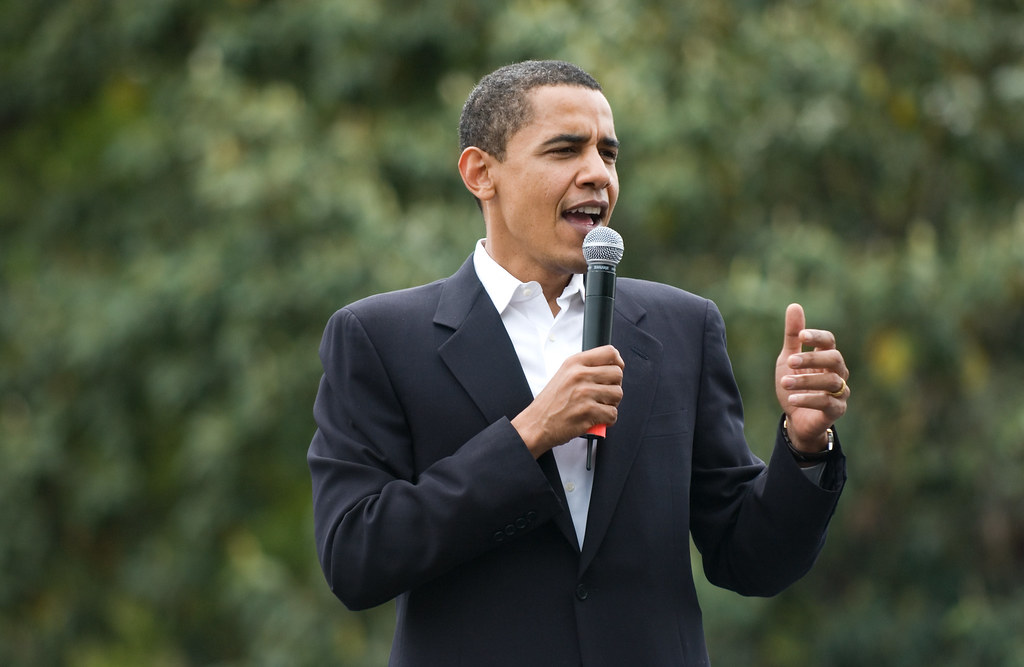 Barack Obama’s 2008 run, a classic identity play, emphasized the history-making potential of electing the nation’s first Black president. No one knew or cared much about Obama’s policy positions, and he didn’t bother to share them. Bernie Sanders’ 2016 and 2020 bids were policy arguments focused around a succinct set of issues: student loan debt, the minimum wage and healthcare. The fact that he would have been the first Jewish president was scarcely noticed.
Barack Obama’s 2008 run, a classic identity play, emphasized the history-making potential of electing the nation’s first Black president. No one knew or cared much about Obama’s policy positions, and he didn’t bother to share them. Bernie Sanders’ 2016 and 2020 bids were policy arguments focused around a succinct set of issues: student loan debt, the minimum wage and healthcare. The fact that he would have been the first Jewish president was scarcely noticed.
If I were one of the Democratic strategists advising Kamala Harris’ rump 2024 campaign for president, I would focus on an identity play emphasizing her race and gender over a run about a set of policies. Which is exactly what she’s doing. “The longer the Harris campaign can portray her as a cultural phenomenon,” The New York Times reported on July 31st, “the longer she can avoid articulating details of her policy agenda that could divide her support…For now, the Harris team intends to skip some of the traditional markers of a presidential bid. While Ms. Harris released a host of policy papers during her 2020 campaign—some of which she has since disavowed—this time she plans to cast herself as a policy extension of Mr. Biden’s administration.”
“I think we are three weeks from knowing whether she can ascend the Obama ladder to where it’s about her and not any specific policies she has,” Rick Davis, campaign manager for McCain in 2008, told the Times.
If Kamala Harris can get elected without making policy promises, good for her. But we, as individual voters, have different interests than she does.
“I’m with her,” a Hillary Clinton campaign slogan quickly adopted by Kamala Harris supporters, is exactly the opposite of what representative democracy is supposed to be about. She should be watching our backs. A politician ought to be there for us, fighting like hell to improve our lives.
Just as Harris is attempting to do now, Obama ran as a rock star, long on charisma and short on specifics. Progressives and other leftists who gave him their votes quickly learned that being young, Black and cool enough to enjoy weed is no guarantee that a candidate will govern any better or differently than a boring old white guy. As president, Obama did exactly what a Republican would have done. He refused to codify Roe v. Wade (he called abortion rights “not the highest legislative priority”), granted full immunity to Guantánamo torturers, sent tens of thousands of more troops to the losing wars against Afghanistan and Iraq, used assassination drones 10 times more than Bush and supported the military coup against the democratically-elected, left-leaning president of Honduras.
Obama’s decision to bail out Wall Street but not Main Street after the 2008-09 subprime mortgage crisis prompted pissed-off progressives to form the Occupy Wall Street movement in late 2011. True to right-wing form, Obama had his Homeland Security department partner with Wall Street banks, real estate companies, local police and the FBI to ruthlessly crush hundreds of Occupy encampments in violent coordinated raids.
Obama is still a rock star. But he gravely wounded the Democratic Party. Obamaism led directly to the surprise success of Bernie Sanders’ insurgent 2016 campaign—and the intraparty schism that allowed Donald Trump’s surprise win.
Let’s not get fooled again. If the left-leaning Democrats who comprise the majority of the party’s voters want to avoid getting conned into supporting another DINO like Obama, they must insist upon a clear and coherent policy agenda for a first Harris Administration. “She is not Trump” is not enough. Nor is “we need a Black woman president.” By those standards, we could have elected Condoleezza Rice.
We don’t know nearly enough about Harris’s stances on the issues. The little we have learned so far on matters like Gaza (she supports Israel), universal healthcare (she’s against it) and the long-frozen minimum wage (she doesn’t talk about it) doesn’t give much reason for optimism from a leftist point of view.
It’s been more than two weeks since she became the Democratic standardbearer. Yet she still refuses to give any press conferences—something every candidate and every president ought to do daily, 365 days a year—or interviews with reporters. Like the senile Biden, every word she utters in public is read off a Teleprompter.
If she won’t tell us what she thinks, and we don’t like what she says, she shouldn’t get our votes.
(Ted Rall (Twitter: @tedrall), the political cartoonist, columnist and graphic novelist, co-hosts the left-vs-right DMZ America podcast with fellow cartoonist Scott Stantis. His latest book, brand-new right now, is the graphic novel 2024: Revisited.)

